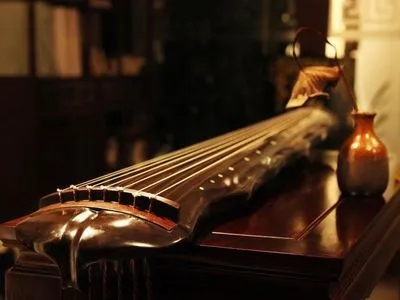The specific steps of the guqin positive overtone tuning method
330 views · Organized by 某某 on 2022-06-18
How to use overtones on a guqin? Today, I will share with you the specific steps of the positive harmonic tuning method.

The tuning method of the positive tune (F key), after tuning, the dispersion of the seven strings from the first string (gong string) to the seventh string (wu string) is 5, 6, 1, 2, 3, 5, 6, 1= F.
First prepare a whistle or tuning fork with standard tone A.
- Blow the whistle and let the five strings and seven emblems be at the same height as the standard tone A.
- Use the five emblems of the name finger to pick the seven strings, and the four emblems of the index finger to hook the five strings, so that the overtones of the two strings are at the same height. The seventh string should be based on the fifth string. If the two strings are different in height, do not move the fifth string when tuning the seventh string. The same is true below.
- After the seventh string is aligned, use the seventh string to tune the fourth string. The seven emblems of the big finger generally pick up the seven strings, and the nine emblems of the name finger generally hook the four strings, so that the overtones of the two strings are at the same height.
- Use the fourth string to tune the sixth string. The five emblems of the name finger generally pick six strings, and the four emblems of the index finger generally hook the four strings, so that the overtones of the two strings are at the same height.
- Use the sixth string to tune the third string. The seven emblems of the big finger generally pick six strings, and the nine emblems of the name finger are generally hooked to the three strings, so that the overtones of the two strings are at the same height.
- Use the fifth string to tune the second string. The seven emblems of the big finger generally pick the five strings, and the nine emblems of the name finger are generally hooked to the second string, so that the overtones of the two strings are at the same height.
- Finally, tune the first string with the fourth string. The seven emblems of the big finger generally pick four strings, and the nine emblems of the name finger are generally hooked to one string, so that the overtones of the two strings are at the same height.
At this point, all seven strings are tuned.
Involving musical instruments
Guqin (pinyin: Gǔ Qín) is a traditional Chinese musical instrument with a history of at least 3,500 years. Guqin is also known as Yaoqin, Yuqin and Seven-stringed Qin. The guqin has 13 emblems that mark the rhythm, and is also a ritual and musical instrument. It belongs to the silk in the octave. Guqin has a wide range, deep timbre and long aftertone.
Guess you like
Organized by 未知领地 on 2024-03-17
When selecting a guqin, the timbre quality is often the primary criterion to judge its quality, because the timbre is not only related to the artistic expression of the guqin, but also deeply rooted in the unique pursuit of music aesthetics in traditional Chinese culture. Here are some basic timbre elements to consider when choosing a guqin.
read >>
Organized by 卷鹅 on 2024-03-14
With the arrival of the hot summer, for the guqin friends, how to do a good job in the hot and humid season of guqin maintenance is particularly important. Guqin as a traditional Chinese wooden chord instrument, its material is very sensitive to changes in temperature and humidity, so the correct maintenance of guqin in summer can not only extend the life of the instrument, but also maintain its pure timbre.
read >>
Organized by 雨童 on 2024-03-14
Guqin, as an ancient and rich cultural instrument in China, its playing techniques pay attention to the integration of body and mind, rhythm and emotion. In the process of learning Guqin, there is a set of sixteen words that condense the wisdom of countless piano players. They are: "Light, loose, slow, even, Tian, light, elegant, beautiful, bright, mining, quiet, far, ancient, clumsy, middle, and".
read >>
Organized by 迦夜 on 2024-03-13
Guqin, as one of the oldest plucked instruments in China, the beauty of its rhyme lies not only in the pleasant tone, but also in whether it can pop out the kind of "ancient flavor" that has traversed thousands of years.
read >>
Organized by 梦昱 on 2024-03-13
In the pursuit of Guqin skills on the road, many qin friends may encounter such a problem: despite putting in a lot of time and energy to practice hard, but the pace of progress does not seem to be as obvious as expected. This phenomenon not only dampened the enthusiasm of learners, but also triggered deep thinking on the way to improve guqin skills.
read >>
 渝公网安备 50010702504639号
渝公网安备 50010702504639号